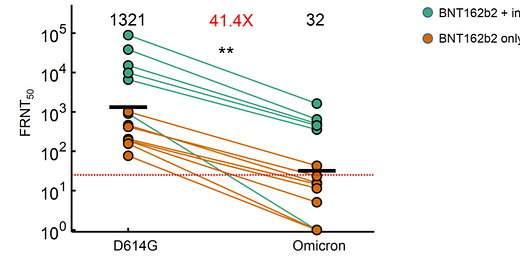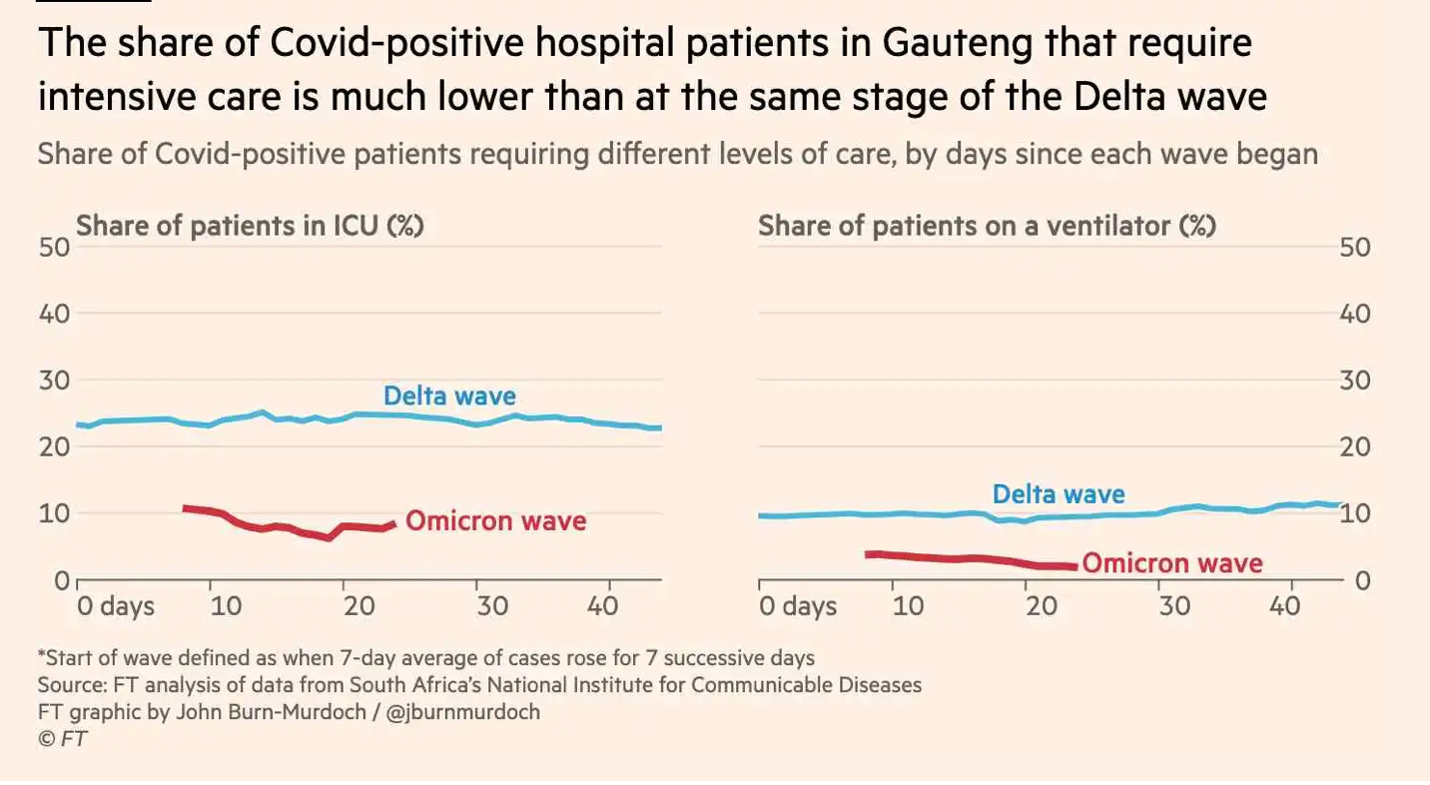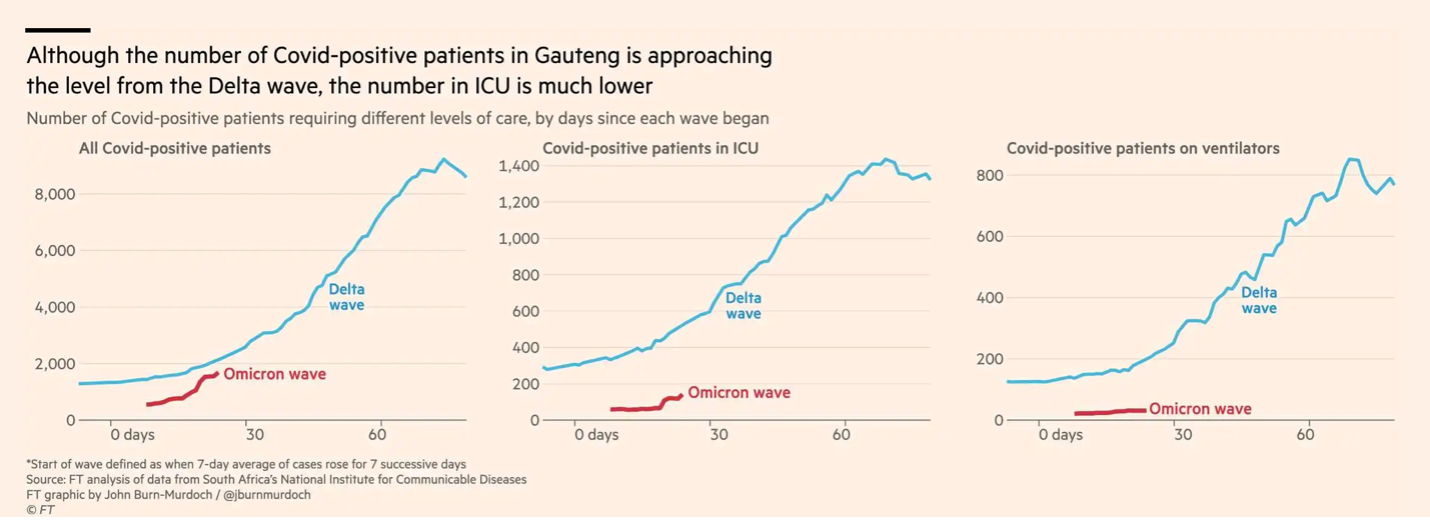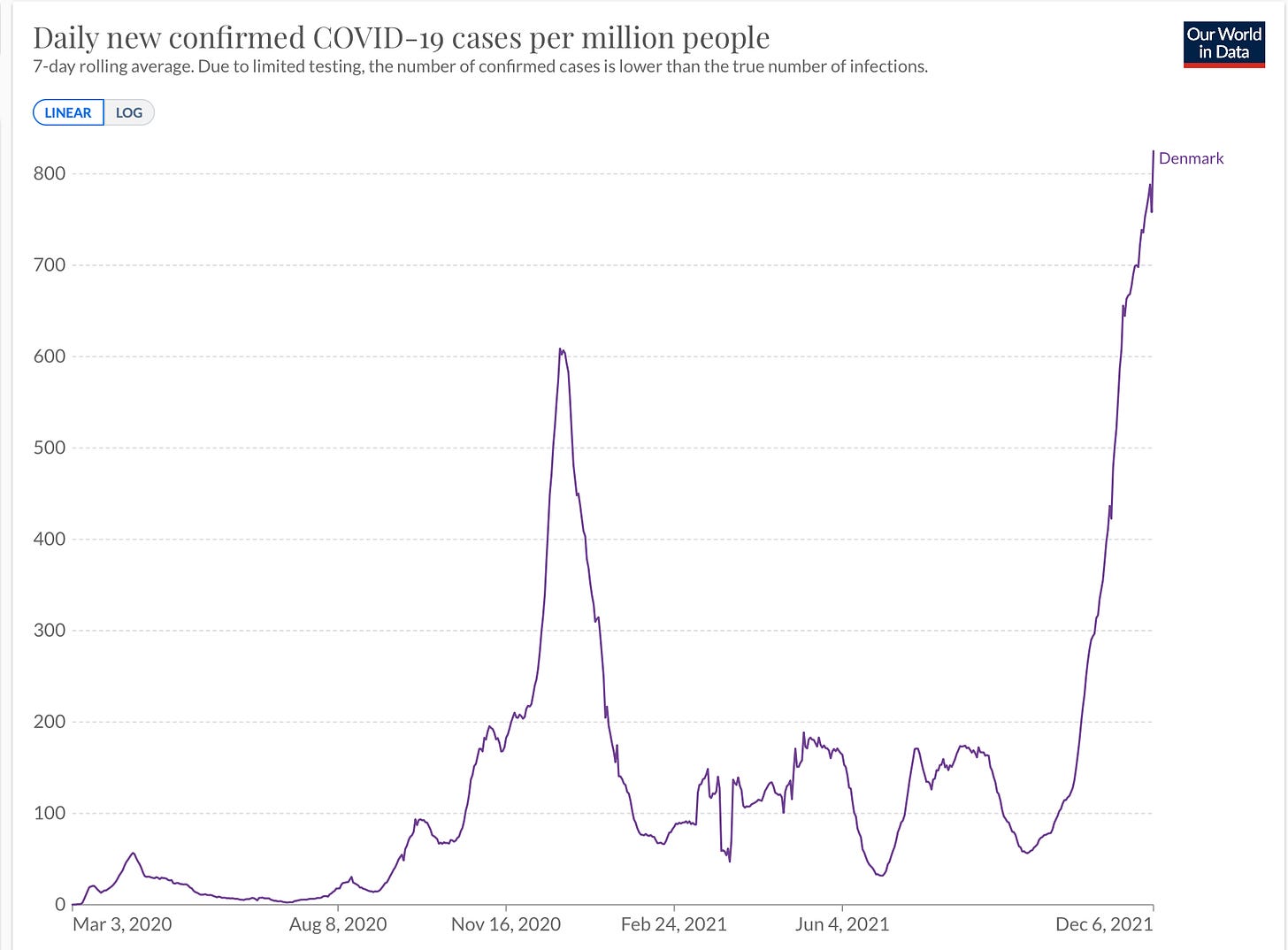Is Omicron Ominous?
What we've learned from all the new data with this new variant
The short answer is yes. It’s still early, and there are plenty of mixed signals, but here is what we know and the holes in our knowledge base that will soon be filled in.
1. Omicron is clearly more immune evasive than any prior variant
Omicron has an extraordinary number of mutations, greater than 50, compared with the Wuhan ancestral strain and with their positions in the virus, more than 30 of these within the spike protein, there is considerable “antigenic drift”— this version of the virus looks different to our immune system compared with prior versions of SARS-CoV-2. In South Africa, where there have been three major waves during the pandemic so far, the reinfection rate for people with prior Covid was low but more than doubled since the Omicron outbreak began. That is a definite sign of immune evasion, since the people who developed immunity from prior infection were unable to fend off a new one with Omicron. The term “immune escape” is frequently used, but it’s not all or none; it’s a continuum. This property of the live virus was quantified in the Alex Sigal lab in South Africa for the first time yesterday by taking blood samples from 12 people who have been vaccinated or prior infection plus vaccinated and determining what level of antibodies are required to neutralize Omicron. Here is the key graph that shows people with hybrid immunity (infection plus vaccination) had preserved protection, but the people with 2 vaccine shots did not. (Note that the ~40-fold overall reduction of neutralization is a lab result, different from and not proportionate to some level of reduced immunity seen clinically.) Similar results have since been made available by 2 other academic groups (Karolinska Institute, Sweden and Goethe University, Frankfurt, Germany) extended to the Moderna vaccine, and by Pfizer today. The protection should be restored by the 3rd (booster) shot because the data to date shows a striking (~30-40-fold) rise in neutralizing antibodies after a 3rd shot
This aligns with the reinfection risk that has surfaced for Omicron, its immune evasive property has also become apparent by diminishing vaccine protection. Among the early detected cases around the world, many breakthrough infections were reported in people considered fully vaccinated, some even weeks after receiving their third (booster) shots. These cases have largely been associated with mild symptoms, aligning with the expectation that vaccine protection against severe Covid illness will be preserved.
The immune escape property of Omicron, with potential to override our vaccines, is the central concern and can be met 3 ways: (1) booster shots, (2) an Omicron-specific vaccine, and (3) a pan-sarbecovirus vaccine which would theoretically be variant-proof. Fortunately, our immune response to Omicron is not just tied to the rapid neutralizing antibodies; it also relies on T cells, which have been strongly linked to prevention of severe disease, hospitalizations and deaths. Variants, to date, have had only minimal influence on the T-cell response. Even with Omicron’s ability to evade our antibodies to some extent, it will have a harder time overriding our memory, on-demand T cells induced by vaccination or prior infections. That provides hope for preserved protection from hospitalizations and deaths, for which we’ll have data in the weeks ahead.
2. Is Omicron more contagious than Delta? Likely yes, but how much?
This seems probable because we have already seen Omicron’s very steep growth curves and superspreader events in Norway, Denmark, and the United Kingdom, with a high proportion of individuals infected. Like with the immune evasion feature, the question here is the magnitude of more infectiousness compared with Delta. The European Center for Disease Prevention and Control projects that Omicron will become the dominant virus strain in Europe in coming months. That’s because it appears to have both increased infectiousness and the ability to evade our immune response. Remember that increased transmission can be from either more contagiousness or more immune evasion or both. The magnitude of change for these properties will determine if (likely when) and how long it will take for Omicron to replace Delta as the major strain throughout the world.
2. Does Omicron cause more mild or severe illness than Delta?
Early reports from South Africa indicated the possibility that cases were more mild, requiring less hospitalizations and oxygen supplementation. But the population assessed was predominantly young, had prior Covid, or were vaccinated. We can hope this is the case but will not really know the answer to this question until much larger numbers of people aged 60 plus, those without prior infection, or vaccination, or several months out from vaccination, are studied. Fortunately, there are no data to suggest Omicron is associated with more lethality or severe Covid than prior variants.
Here are recent data summarized for less ICU requirement in Gauteng, the epicenter for Omicron
A key point here is that high transmissibility, which we are clearly seeing, will get a lot more people infected. Even if a smaller fraction do get severe illness, that’s still a lot more people very sick. That also means more Long Covid, too, which can occur with mild cases and can be quite disabling.
4. Omicron will prolong the pandemic
We haven’t yet gotten Delta in any semblance of containment here in the US and even in many countries that have much higher vaccination rates, such as Denmark (the top virus sequencing country in the world), where Omicron has quickly gotten above 2% of cases.
This portends new waves across the globe as Omicron fully competes with Delta, ultimately displacing it, which will take months. The contingency is that another variant that could crop up that competes with Omicron (hopefully not, but we can’t rule that out). So instead of achieving an endemic state soon, that’ll, at best, be delayed a matter of months. This reinforces why we must get the entire global population of people protected ASAP, to ultimately achieve containment everywhere.
I wish I had a better report for the first edition of Ground Truths. Maybe it should have been called hard, inconvenient truths today. I’m sure we’ll get more reassuring clinical data on the protection from boosters and the efficacy of anti-Covid pills, particularly Paxlovid, which should prove to be fully effective versus Omicron, in the days ahead. We’ll review how important these pills are going to play in subsequent posts. In the meantime, we know and have all the mitigation measures that would protect against any respiratory virus. And if you haven’t gotten boosted, please go for it. If you’ve had Covid and a vaccination, you should be well protected. We can, and will, with all the tools at our disposal, get through this latest challenge.








Actually Omicron may end the pandemic the way previous pandemics have ended with increasing transmissibility and decreasing lethality - it can end the pandemic if we let it.
Why is there no comparison with people who never had the Pfizer vaccine? Is it so because it would show that vaccination erodes the neutralization capacity of natural infection alone without vaccination?
No Previous Infection ✓ Ignored
Previous Infection - No Vaccination ✓ Ignored
Vaccination (before or after infection not stratified) 3x loss of neutralization
Vaccination and no infection 41x loss of neutralization.
Ground Truth- These studies are meant to hide any deleterious effects of vaccination.
Please debate Vaccine Safety expert Steve Kirsch, Dr. Vanden Bossche, Dr. Malone, Dr. McCullough on Joe Rogan's Podcast - 12hour special.
This is the ground truth. Welcome onboard.